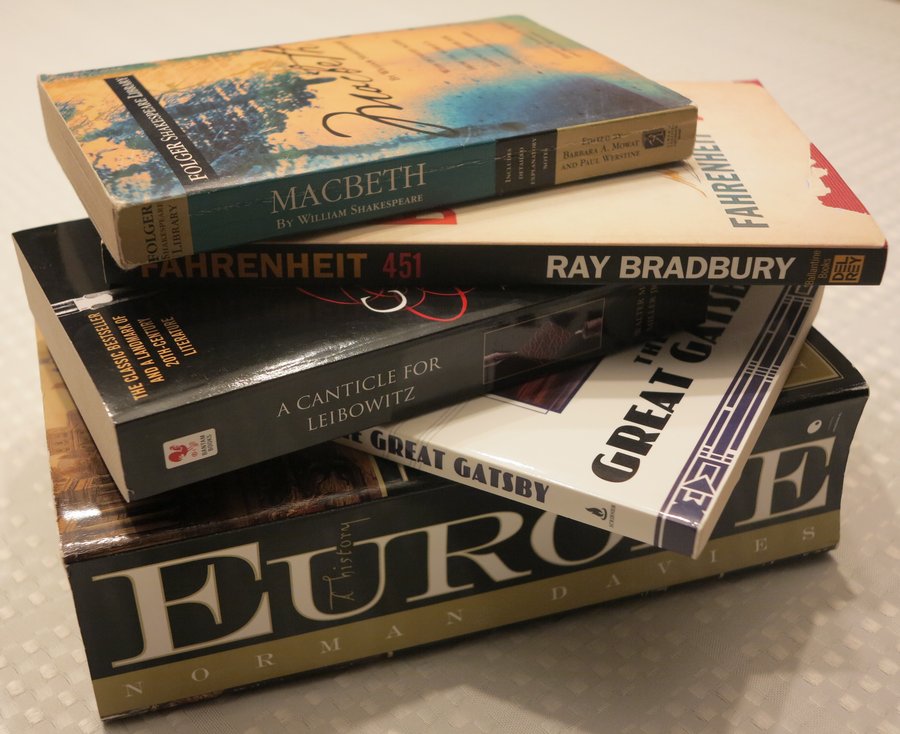For honors students in high schools around Hudson County, summer vacation has been invaded this year by men named Shakespeare, Sophocles, and Aristotle – and even a woman named Ayn Rand.
At Bayonne High School, senior honors students are instructed to read Ayn Rand’s The Fountainhead, a 700-page philosophical novel of individualism, as well as Umberto Eco’s The Name of the Rose, a 500-page historical murder mystery set in the year 1327. And that’s just for English. Students in AP English also take AP European History, so add on at least 700 more pages.
“I’m booked solid for the summer and homework gets in the way. It’s not that I don’t want to start,” said Bayonne High School senior Jesse Wolleon. “I simply cannot.” Wolleon also has a summer job at the Bayonne Recreational Division Young Children’s Program.
Freshman Honors English students at Union City High School said they have been assigned as much as 1,000 pages of reading for the summer.
Union City High School senior Precious Martinez works five days a week in a biomedical engineering lab at the New Jersey Institute of Technology, conducting research on breast cancer. She is also president of her class, president of the Society of Hispanic Professional Engineers, vice president of the Mu Alpha Theta Mathematics Honor Society, and a member of the cross country track team, which practices during the summer. Although she believes summer reading prevents students from diving blindly into coursework, she said she has no free time to go to the beach, let alone read books she actually enjoys.
“I basically have no summer,” she lamented.
Required reading for upper grades at Union City High includes classics such as The Crucible by Arthur Miller and The Sun Also Rises by Ernest Hemingway.
At Secaucus High School, students must read one of Mitch Albom’s books, depending on their grade level – The Five People You Meet in Heaven, For One More Day, or Tuesdays with Morrie – as well as Paul Coelho’s The Alchemist. In addition, The AP English classes are required to read some extra non-fiction: either Eric Schlosser’s Fast Food Nation, an investigation of the local and global influence of the American fast food industry, or Randy Pausch’s The Last Lecture, a discussion of everything the author wanted his children to know after he was diagnosed with pancreatic cancer.
Freshmen at Memorial High School in West New York must explore the gritty romance of ethnically separated lovers in Irving Shulman’s novelization of West Side Story. Juniors are exposed to European mythology, gothic horror, and existentialism through the not-so-summery novels, Grendel, Frankenstein, and The Stranger.
Why summer reading?
“It is important that students continue to read or do academic work during the summer because it will develop an extensive background of information that can serve as a platform from which to engage their own independent knowledge,” said Ivan Rivadeneyra, a sophomore honors geometry teacher at Union City High School.
However, Rivadeneyra believes students should have free time, too. “One should not take away pleasant moments from any child,” he said.
Kate Kitzie, the English Coordinator at Weehawken High School, said, “There is no harm in reading at any time and the benefits far outweigh what the kids perceive as a gross incursion on their vacation hours.” According to Kitzie, the forestalling of “summer brain death” is an obvious benefit. “Learning doesn’t end in June and begin in September. It’s an ongoing process,” she said.
Factors such as SAT preparation, college applications, summer jobs, and pre-college courses also figure into the mix.
Private schools have piled on the summer reading as well. Tara McDonough, a senior AP English student at St. Dominic Academy in Jersey City, must read a grand total of 1,100 pages this summer, including Charlotte Bronte’s Jane Eyre, Truman Capote’s crime novel In Cold Blood, and Matthew Pearl’s Civil War murder mystery, The Dante Club.
“I’m interested in reading these novels,” she said, “but they’re not that short or easy to read.”
While most AP and Honors students choose to take AP classes in hopes of expanding their academic horizons, they are aware that the heavy summer reading will foreshadow a rigorous curriculum for the upcoming school year.
Jessica Sulima can be reached at editorial@hudsonreporter.com.
